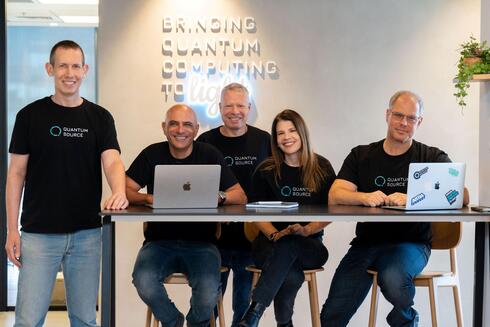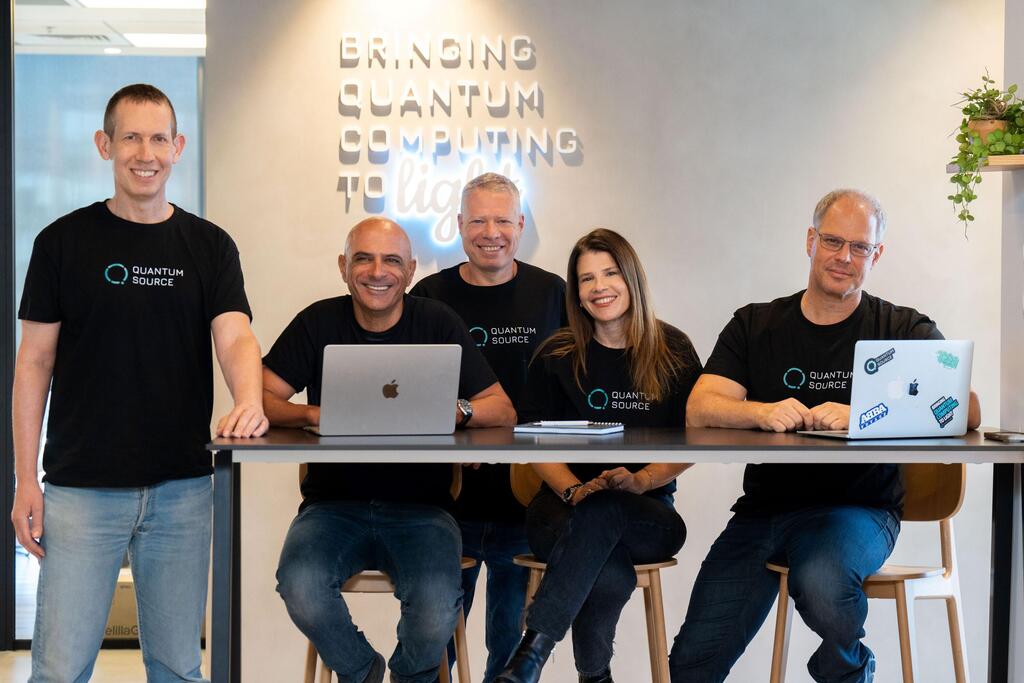
Quantum Source secures $50 million Series A to advance photonic quantum computers
The Israeli startup targets breakthroughs in quantum computing with its photonic approach and growing investor confidence.
Quantum Source, a startup developing technology for practical photonic quantum computers, has raised $50 million in a Series A funding round. The funding round was led by Eclipse, with participation from Standard Investments, Level VC, Canon Equity, as well as existing investors Pitango First, Grove Ventures, 10D, and Dell Technologies Capital. This round brings Quantum Source's total capital raised to $77 million.
Quantum Source was founded in 2021 by semiconductor industry veterans and serial entrepreneurs Oded Melamed (CEO), Gil Semo (VP R&D), Dan Charash (Chairman), and Professor Barak Dayan (Chief Scientist), a world-leading scientist in the field of quantum optics.
1 View gallery


Quantum Source's (from left) Dan Charash, Chairman, Oded Melamed, CEO, Gil Semo, VP R&D, Shlomit Semel, VP HR, Prof. Barak Dayan, Chief Scientist.
(Rami Zarnegar)
Quantum computing is a fundamental paradigm shift in computing, with the potential to dramatically accelerate technological advancements in drug design, material development, cybersecurity, and more. Large-scale, fault-tolerant quantum computers, with millions of qubits, are critical to unlocking the potential of quantum computing but have yet to reach commercial viability. Quantum Source has taken a novel approach that harnesses single atoms trapped on a proprietary photonic chip to allow deterministic photon generation and entanglement. According to the company, this results in four orders of magnitude better efficiency compared to other implementations.
Quantum Source currently employs 45 people at the Ness Ziona Science Park, with over half holding PhDs in physics, mathematics, or electronic engineering. Six professors also support the company's work on a temporary basis. Last year, the company announced a $12M Seed extension led by Dell Technologies Capital, taking it to a total $27M, and welcomed former Israeli Prime Minister Naftali Bennett to its Board of Directors
In an interview with Calcalist, Melamed noted that "hiring is very challenging for us, as we need to find candidates with the right academic background and skill sets. This recent funding will allow us to continue building a solid foundation. We aim to put Israel on the global quantum computing map."
Melamed explained that Quantum Source's approach differs from most other quantum computing companies. "We focus on the photonic approach, which offers a unique way to build quantum computers at significantly lower costs. Our goal is to build a large-scale quantum computer based on our technology before the end of the decade," he said. However, he cautioned that this is not an overnight process. "We are conducting extensive testing and hitting important milestones, but there is still a lot of work to be done in terms of optimization and miniaturization."
Quantum photonic computing recently gained attention due to two major deals: the Australian government committed approximately $620 million to implement a photonic quantum computer, and the state of Illinois in the U.S. announced a $500 million investment in a similar system.
Despite being the most promising route, current photonic quantum technologies face challenges, including inefficiencies in generating individual photons and in weaving them together. A photonic quantum computer with a million qubits would require a space the size of a football field and consume as much energy as a small city. Quantum Source's technology directly addresses these challenges.
"The recent wave of government investments, which poured hundreds of millions of dollars into the development of photonic quantum computers, is a recognition of the potential and promise of this technology,” said Bennett. “Quantum Source’s solution plays a decisive role in this revolution, and I am honored to be part of this groundbreaking journey."














